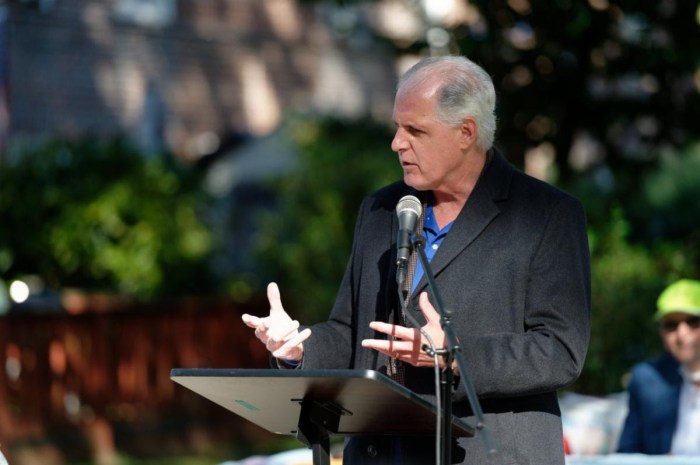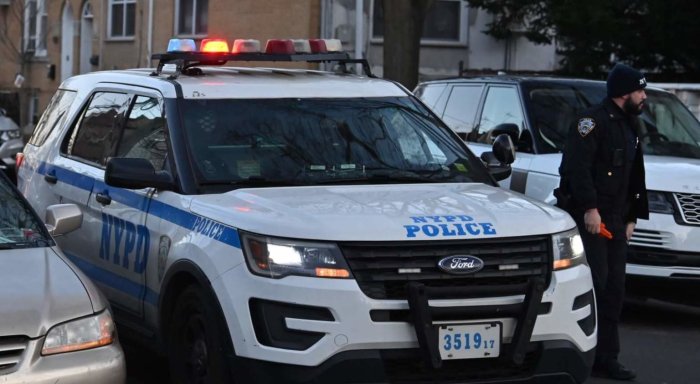By Kathianne Boniello
A week after the Nov. 7 election for president, no clear winner had been determined, with the race coming down to a recount of votes in Florida. Florida represents the critical 25 electoral votes, which should decide who wins the White House.
U.S. Rep. Gary Ackerman (D-Bayside) said that if Bush won the Electoral College race but not the popular vote, it should not be contested.
“That's the system we have and that's the constitution,” he said. “That's the way the game is played and those are the rules.”
State Assemblyman Brian McLaughlin (D-Flushing) defended the Electoral College as “fair” and said he did not think the system should be overhauled.
U.S. Rep. Gregory Meeks (D-St. Albans) said the constitutional process should not be changed mid-stream even though he has reservations about electoral votes.
“I would think we need to review to process,” he said. “I would be willing to work in Congress to overhaul the system. [But] if a person is the winner based on the Constitution, I am prepared to accept them.”
State Sen. Serphin Maltese (R-Glendale), who is head of the Queens Republican Party, warned that the abolishment of the Electoral College without a congressional mandate would be dangerous for the country.
State Assemblywoman Marge Markey (D-Elmhurst) also called for calm, advising against a “knee-jerk reaction” to the presidential election.
“Right now everyone's very emotional – we should have some time to really review this,” she said.
But City Councilman Sheldon Leffler (D-Hollis) called for an end to the Electoral College.
“I think we should move to a one-person, one-vote system,” he said.
From congressional officials to local party leaders, Queens politicians urged a review of how people in the borough and the country vote and several decried the inefficiencies of paper ballots, where were used at some polling spots in Queens when problems with voter registration or machines developed.
U.S. Sen. Charles Schumer (D-N.Y.) said he would introduce legislation in January to fund a comprehensive study by the Federal Elections Commission on alternate methods of voting and to create a matching grant program to give states a financial incentive to implement new voting methods.
“We should use our latest advances in technology and our vast collective experience to make voting as accurate, convenient and accessible as possible,” he said. Schumer suggested using the Internet, the mail, and expanded voting hours to improve the voting system in the country.
William Lewis, a Conservative Party district leader and chairman of the Bayside Conservative Party Club, criticized the use of paper ballots.
“Paper ballots can be damaged, so mistakes can be made easily,” he said. “It just slows down the process and makes it difficult to get an accurate count.”
State Sen. George Onorato (D-Long Island City) said “to have paper ballots in the 21st century is unconscionable. The rest of the world is laughing at us.”
Representatives for Bush and Gore spent Tuesday debating the deadlines for a recount of votes in several Florida counties. Several Queens legislators expressed anger over the move to limit the recounts.
State Assemblyman Mark Weprin (D-Bayside) suggested that all of Florida should be recounted by hand.
“People need to feel like the right person was elected,” he said.
Ackerman, who said he spoke to Democratic Vice Presidential Candidate Joe Lieberman Monday night, said “people who voted need to have their votes count. It's not about the Republicans or Democrats – it has to be right.”
“The hand recount should take place,” said state Assemblyman Bill Scarborough (D-St. Albans).
“Gore was absolutely right,” he said. “This race was too close to call and there are too many irregularities.”
While the networks called the race in favor of Bush at about 2 a.m. Nov. 8, saying he had won Florida's 25 electoral votes, that projection was quickly reversed.
As of presstime Gore appeared to have won the nation's popular vote by a narrow margin, but Bush seemed to have an edge in the Florida count. Nevertheless, overseas absentee ballots still had to be counted by midnight Friday.
The United States elects its president by allotting a certain number of electoral votes to each state, forming the Electoral College. On Election Day, voters in each state cast their ballots, forming the popular vote.
The Republicans retained a slim majority in the U.S. House of Representatives and were in a dead heat for control of the Senate. Both Ackerman and Schumer said the slender Republican margin in the House coupled with a narrow victory for whoever is elected president would force both parties to work more closely together.
As the events in Florida continued to play out, state Assemblyman Bill Scarborough (D-St. Albans) had one hope for the future.
“If there is any silver lining in this cloud,” he said, “it should be very clear to everybody how much one vote can count.”
The Times/Ledger staff contributed to this story.



































